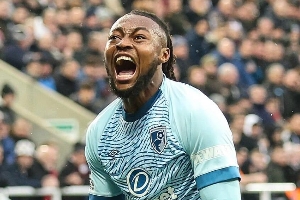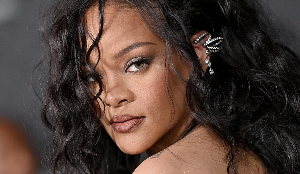- Home - News
- TWI News | TV
- Polls
- Year In Review
- News Archive
- Crime & Punishment
- Politics
- Regional
- Editorial
- Health
- Ghanaians Abroad
- Tabloid
- Africa
- Religion
- Election 2020
- Coronavirus
- News Videos | TV
- Photo Archives
- News Headlines
- Press Release
Opinions of Friday, 31 August 2007
Columnist: This Day
Presidential Race: A Neutral Observer's View
That the incumbent President of Ghana, Mr. John Agyekum Kufuor will step down come February, 2008 is no longer news. Rather what is agitating the minds of Ghanaians is: Who takes the baton from him to lead the second African country after Liberia to gain political independence?
2000 & 2004 Race
Kufuor literarily bearded the lion in its own den in the year 2000 when he routed the National Democratic Party (NDC) presidential candidate, Professor John Evans Atta-Mills. The then out-going President, Jerry Rawlings was and still is the founder and national leader of the NDC. Kufuor contested on the platform of the New Patriotic Party (NPP) and at the time, NPP was the leading opposition party. But notwithstanding the power of incumbency, he vanquished the NDC candidate, Professor Atta-Mills. Kufuor was re-elected on the platform of NPP in 2004. On that occasion, he again dusted Professor Atta-Mills. But the victory was attained with a narrower margin of 52% to 42%.Dominace of NDC & NPP
In Ghana today, the two dominant political parties remain the NPP and the NDC. The scenario is a reverse situation prior to 2000. The NPP led by President Kufuor, the out-going president is the ruling party while the NDC is the leading opposition party seeking to recapture the presidency. Rawlings and Kufuor as the two towering political figures will assuredly influence the election or selection of presidential candidates of the two parties.The founder of the NDC, Rawlings usurped power in 1979 through the force of arms. As President of the Armed Forces Revolutionary Council (AFRC), he ruled Ghana through military fiat for about 10 years before transmuting to a civilian president. He served as an elected civilian president of Ghana for the maximum two terms before retiring in 2000. Earlier, Dr. Hilla Liman had, based on Rawlings endorsement, ruled on the platform of the party for a single term. Thus the NDC has ruled Ghana under the subsisting civil dispensation for almost 12 years. The NPP on its part would have ruled for eight years by the time Kufuor completes his second term early next year.
NPP Prez Aspirants
In the run down to the delegates conference of the ruling NPP, the presidential aspirants on the platform of the party are a legion. The contenders include the incumbent Vice President, Alhaji Aliu Mahama, a Muslim from the Northern Region, Mr. Alan Kyeremanten from Ashanti Region, widely believed to be the favoured candidate of President Kufuor. Also in the race on the platform of the NPP is Professor Kwabena Frimpong Boateng, the out-going Chief Executive of Korle-Bu Teaching Hospital, the biggest hospital in Ghana . He is from the Eastern Region.Another NPP presidential contender is Nana Akufo-Addo, the immediate past minister of Foreign Affairs. Apparently aware that he was not the favourite of the incumbent President, Akufo-Addo last week canvassed an amendment of the NPP constitution to divest the President, ministers, MPs, national and regional officers of automatic right of vote at the party's forthcoming national delegates conference scheduled for December 14 this year.
Critics of Kufuor say it amounts to nepotism for him to throw his weight behind his Ashanti kinsman, Kyeremanten. They accuse the party leadership of not subscribing to ethno-regional balance despite the fact that Ghana as a country is made up of about 40 ethnic groups spread over10 regions. But the party counters by saying that merit and national interest supercede sectional considerations since Ghana at any time deserves nothing short of the very best in leadership, politics and all sectors.
All things being equal, the race for the NPP presidential ticket appears to be a straight fight between Kyeremanten and Vice President Mahama. But obviously, the odds are stacked against Mahama by virtue of his non-endorsement by President Kufuor.
Professor Atta-Mills
The NDC presidential candidate, Professor Atta-Mills is an early bird in the current race. He was interestingly nominated by his party since April this year nearly twelve months to the presidential elections. Atta-Mills is a Fanti from Cape Coast in the Central Region. Just like the incumbent President Kufuor, Atta-Mills is urbane and affable. His successive defeats to Kufuor in 2000 and 2004 have been largely attributed by analysts here not to his own weakness as a person. Rather they have been linked the losses to some extraneous factors.These had to do with the fact that at the time of those elections, people had become tired of what was then considered the Rawlings' persona and his alleged police state style. They then wanted a break in party and personnel.
Nostalgic Memories of Rawlings
Presently, the political mood appears to be changing once more with more and more Ghanaians having nostalgic memories of the Rawlings' era noted for its discipline, raw determination and national passion. In markets, street shops and other places, it is now a common feature to see Rawlings posters and almanacs being sold and displayed with gusto. The bulk of Rawlings' followers are drawn from the lower social classes who still see in him an emancipator of sorts. The NDC is expectedly capitalizing on this growing fervour for its own political gains ahead of the crucial elections of next year. The party expects that many of its candidates particularly, at the federal level would benefit from the Rawlings persona and appeal.The Other Parties
The other smaller political parties include the Convention Peoples Party (CPP), the Democratic Front Party (DFP), the Ghana Consolidated Peoples Party (GCPP), the Peoples National Convention (PNC) and the United Ghana Movement (UGM). The UGM recently became extinct having won zero seats at all levels and voluntarily quitting the scene. In the Parliament, the NPP is the majority party. It is followed by the NDC, CPP and the PNC in that order.Ghanaian Parliament Today
The NPP has majority of the seats in the 230 seats Ghanaian Parliament. It is followed by the NDC, the CPP and the PNC in that order. Although there are seven registered political parties in Ghana , the battle for the presidency in the next election is seen as a two cornered fight between the ruling NPP and the opposition leader, NDC. The NPP has as its ace the power of incumbency and the accompanying deep pockets which would be valuable in prosecuting a flamboyant campaign exercise. But beyond that the NDC seems to be gaining more in following as more Ghanaians yearn for change at least in political personnel. Whichever party emerges tops between the NPP and the NDC in the approaching Ghana presidential election, it is not expected that there would be any significant change in the country's current direction economically and socially.Entertainment









